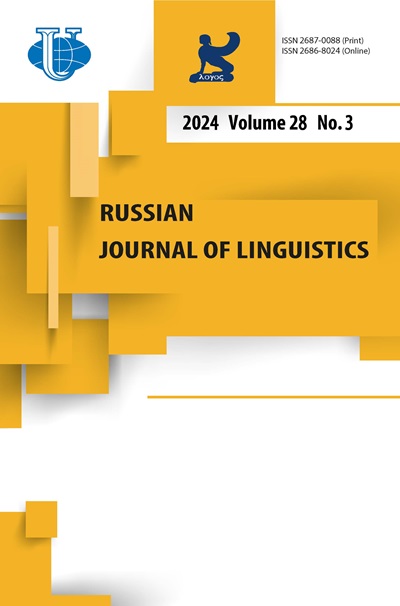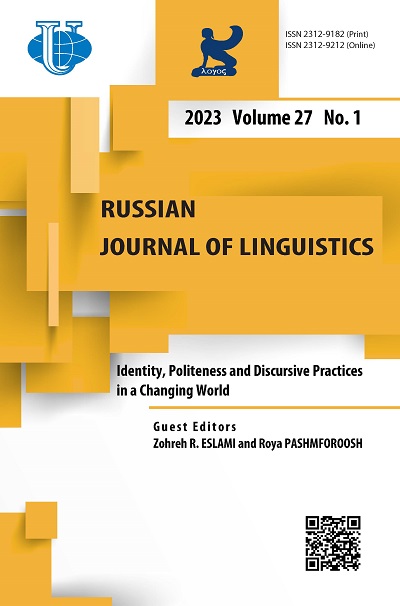Корпусный подход к исследованию корпоративной коммуникации
- Авторы: Малюга Е.Н.1
-
Учреждения:
- Российский университет дружбы народов
- Выпуск: Том 27, № 1 (2023): Идентичность, вежливость и дискурсивные практики в меняющемся мире
- Страницы: 152-172
- Раздел: Статьи
- URL: https://journals.rudn.ru/linguistics/article/view/34231
- DOI: https://doi.org/10.22363/2687-0088-33561
- EDN: https://elibrary.ru/AARCSO
Цитировать
Полный текст
Аннотация
Корпоративная социальная ответственность (КСО) стала действенным инструментом поддержания репутации компаний и одной из из ключевых концепций корпоративной коммуникации. Это привело к необходимости всестороннего изучения языка отчетов КСО, отражающего принципы корпоративной культуры как феномена межкультурной и глобальной значимости. Существующие исследования, рассматривающие тексты отчетов КСО, не дают представления о распределении смысловых приоритетов, проявляющихся в особенностях языкового оформления. В данном исследовании проводится анализ лингвистического окружения наиболее частотных языковых единиц с целью установления повторяющихся языковых моделей, используемых при составлении эффективных отчетов КСО, а также с целью определения приоритетных направлений их текстовой композиции, отражаемых в языке. Корпусный подход и контекстуальный анализ применяются в исследовании отчетов КСО, опубликованных компанией Microsoft за последние семь лет и признанных стандартом качества в корпоративной сфере. Корпус был создан с использованием конкордансера Prime Machine и инкорпорировал 99176 единиц анализа. На основе результатов исследования в работе предлагаются выводы в отношении использования местоимений, конструкций «Microsoft + глагол, обозначающий положительное действие», «more + than», «more + прилагательное», «Corporate» в составе составных терминологических единиц, а также набора ключевых единиц, встречающихся в рамках лингвистического окружения с положительной коннотацией. Это, в свою очередь, позволило идентифицировать иерархию распределения приоритетов, обнаруженную в ходе анализа материала. Полученные результаты способствуют системному осмыслению корпоративной языковой политики, позволяющей поддерживать эффективное коммуникативное взаимодействие с заинтересованными сторонами, и могут быть использованы в дальнейших исследованиях, рассматривающих смежные вопросы как объекты научного интереса.
Об авторах
Елена Николаевна Малюга
Российский университет дружбы народов
Автор, ответственный за переписку.
Email: malyuga-en@rudn.ru
ORCID iD: 0000-0002-6935-0661
профессор лингвистики, заведующая кафедрой иностранных языков экономического факультета Российского университета дружбы народов, доктор филологических наук, академик РАЕН, главный редактор научных журналов «Вопросы прикладной лингвистики» и “Training, Language and Culture”. Ее научные интересы включают теорию и практику межкультурного профессионального и делового общения, прагматику, корпусные исследования, дискурс-анализ. Она является автором и соавтором более 300 публикаций.
Москва, РоссияСписок литературы
- Andrews, Nathan. 2019. Gold Mining and the Discourses of Corporate Social Responsibility in Ghana. New York: Palgrave Macmillan. https://dx.doi.org/10.1007/978-3-319-92321-5
- Boginskaya, Olga A. 2022. Cross-disciplinary variation in metadiscourse: A corpus-based analysis of Russian-authored research article abstracts. Training, Language and Culture 6 (3). 55-66. https://doi.org/10.22363/2521-442X-2022-6-3-55-66
- Breeze, Ruth & Ana M. Fernández-Vallejo. 2020. Comparing corporate social responsibility discourses in the letter to shareholders: The case of British and Spanish banks. ESP Today Journal of English for Specific Purposes at Tertiary Level 8 (2). 250-274. https://dx.doi.org/10.18485/esptoday.2020.8.2.4
- Carroll, Archie B. 1979. A three-dimensional conceptual model of corporate performance. Academy of Management Review 4 (4). 497-505. https://doi.org/10.5465/AMR.1979.4498296
- Casan-Pitarch, Ricardo. 2016. Case study on banks’ webpages: The use of personal pronouns. International Journal of Language Studies 10 (4). 37-58.
- Dahl, Trine & Kjersti Fløttum. 2019. Climate change as a corporate strategy issue: A discourse analysis of three climate reports from the energy sector. Corporate Communications: An International Journal 24 (3). 499-514. https://doi.org/10.1108/CCIJ-08-2018-0088
- Danilet, Magdalena & Olesia Mihai. 2013. CSR online discourse practices in the Romanian energy sector. Journal of Eastern Europe Research in Business & Economics 1. Article 725039. https://doi.org/10.5171/2013.725039
- Ellerup Nielsen, Anne & Christa Thomsen. 2007. Reporting CSR: What and how to say it? Corporate Communications: An International Journal 12 (1). 25-40. https://dx.doi.org/10.1108/13563280710723732
- Grishechko, Ovsanna S., Asya S. Akopova & Elizaveta G. Grishechko. 2015. English linguistic purism: History, development, criticism. Proceedings of Southern Federal University. Philology 4. 185-192. https://doi.org/10.18522/1995-0640-2015-4-185-192
- Ivanova, Svetlana & Tatiana Larina. 2022. “Meaning-Text” theory and the linguistic universe of Igor Mel’čuk. Russian Journal of Linguistics 26 (4). 857-880. https://doi.org/10.22363/2687-0088-32635
- Jaworska, Sylvia. 2018. Change but no climate change: Discourses of climate change in corporate social responsibility reporting in the oil industry. International Journal of Business Communication 55 (2). 194-219. https://dx.doi.org/10.1177/2329488417753951
- Jeaco, Stephen. 2017. Concordancing lexical primings: The rationale and design of a user-friendly corpus tool for English language teaching and self-tutoring based on the Lexical Priming theory of language. In Michael Pace-Sigge & Katie J. Patterson (eds.), Lexical priming: Applications and advances, 273-296. Amsterdam: John Benjamins. https://doi.org/10.1075/SCL.79.11JEA
- Kolk, Ans. 2008. Sustainability, accountability and corporate governance: Exploring multinationals’ reporting practices. Business Strategy and the Environment 17 (1). 1-15. https://doi.org/10.1002/bse.511
- Koller, Veronika. 2009. Corporate self-presentation and self-centredness: A case for cognitive Critical Discourse Analysis. In Hanna Pishwa (ed.), Language and social cognition: Expression of the social mind, 267-288. Berlin: De Gruyter Mouton. https://doi.org/10.1515/9783110216080.2.267
- Lee, Jinyoung & Jane L. Parpart. 2018. Constructing gender identity through masculinity in CSR reports: The South Korean case. Business Ethics: A European Review 27 (4). 309-323. https://dx.doi.org/10.1111/beer.12191
- Livesey, Sharon M. & Kate Kearins. 2002. Transparent and caring corporations? A study of sustainability reports by The Body Shop and Royal Dutch/Shell. Organization & Environment 15 (3). 233-258. https://doi.org/10.1177/1086026602153001
- Malyuga, Elena N. & Asya S. Akopova. 2021. Precedence-setting tokens: Issues of classification and functional attribution. Training, Language and Culture 5 (4). 65-76. https://doi.org/10.22363/2521-442X-2021-5-4-65-76
- Malyuga, Elena N. & Michael McCarthy. 2021. “No” and “net” as response tokens in English and Russian business discourse: In search of a functional equivalence. Russian Journal of Linguistics 25 (2). 391-416. https://doi.org/10.22363/2687-0088-2021-25-2-391-416
- Microsoft. 2022. Reports hub. Retrieved from https://www.microsoft.com/en-us/corporate-responsibility/reports-hub
- Nickerson, Catherine & Elizabeth de Groot. 2005. Dear shareholder, dear stockholder, dear stakeholder: The business letter genre in the annual general report. In Paul Gillaerts & Maurizio Gotti (eds.), Genre variation in business letters, 325-346. Berlin: Peter Lang.
- Nwagbara, Uzoechi & Ataur Belal. 2019. Persuasive language of responsible organisation? A critical discourse analysis of corporate social responsibility (CSR) reports of Nigerian oil companies. Accounting, Auditing & Accountability Journal 32 (8). 2395-2420. https://doi.org/10.1108/AAAJ-03-2016-2485
- O’Connor, Amy & Katherine L. Gronewold. 2013. Black gold, green earth: An analysis of the petroleum industry’s CSR environmental sustainability discourse. Management Communication Quarterly 27 (2). 210-236. https://doi.org/10.1177/0893318912465189
- Petrosyan, Gayane O. & Elizaveta G. Grishechko. 2019. Conflict management in political communication: Linguistic and methodical aspects. Modern Science: Actual Problems of Theory and Practice 11. 100-105.
- Planken, Brigitte, Subrat Sahu & Catherine Nickerson. 2010. Corporate social responsibility communication in the Indian context. Journal of Indian Business Research 2 (1). 10-22. https://doi.org/10.1108/17554191011032910
- Popova, Ksenia V. 2018. Persuasion strategy in online social advertising. Training, Language and Culture 2 (2). 55-65. https://doi.org/10.29366/2018tlc.2.2.4
- Puschmann, Cornelius. 2010. “Thank you for thinking we could”: Use and function of interpersonal pronouns in corporate web logs. In Heidrun Dorgeloh & Anja Wanner (eds.), Syntactic variation and genre, 167-194. Berlin: De Gruyter Mouton. https://dx.doi.org/10.1515/9783110226485
- Rajandran, Kumaran. 2016. Corporate involvement brings environmental improvement: The language of disclosure in Malaysian CSR reports. Social Responsibility Journal 12 (1). 130-146. https://doi.org/10.1108/SRJ-02-2015-0030
- Romanova, Irina D. & Irina V. Smirnova. 2019. Persuasive techniques in advertising. Training, Language and Culture 3 (2). 55-70. https://doi.org/10.29366/2019tlc.3.2.4
- Sehgal, Gaurav, Daisy Mui Hung Kee, An Rou Low, Yan Sin Chin, Eunice Mun Yee Woo, Pei Fern Lee & Farah Almutairi. 2020. Corporate social responsibility: A case study of Microsoft Corporation. Asia Pacific Journal of Management and Education (APJME) 3 (1). 63-71. https://doi.org/10.32535/APJME.V3I1.744
- Talbot, David & Guillaume Barbat. 2020. Water disclosure in the mining sector: An assessment of the credibility of sustainability reports. Corporate Social Responsibility and Environmental Management 27 (3). 1241-1251. https://doi.org/10.1002/csr.1880
- Tamimy, Mihammad, Leila Setayesh Zarei & Mohammad Saber Khaghaninejad. 2022. Collectivism and individualism in US culture: An analysis of attitudes to group work. Training, Language and Culture 6 (2). 20-34. https://doi.org/10.22363/2521-442X-2022-6-2-20-34
- Wei, Lewen. 2020. Examining corporate communications of environmental responsibility on corporate websites: Main themes, linguistic features, and text reuse. Journal of Promotion Management 26 (7). 1013-1037. https://dx.doi.org/10.1080/10496491.2020.1746467
- Yang, Helen Hong, Russell Craig & Alan Farley. 2015. A review of Chinese and English language studies on corporate environmental reporting in China. Critical Perspectives on Accounting 28. 30-48. https://dx.doi.org/10.1016/j.cpa.2014.10.001
- Yu, Danni & Marina Bondi. 2019. A genre-based analysis of forward-looking statements in corporate social responsibility reports. Written Communication 36 (3). 379-409. https://doi.org/10.1177/0741088319841612
- Yuthas, Kristi, Rodney Rogers & Jesse F. Dillard. 2002. Communicative action and corporate annual reports. Journal of Business Ethics 41 (1-2). 141-157. https://dx.doi.org/10.1023/A:1021314626311
- Zsóka, Ágnes & Éva Vajkai. 2018. Corporate sustainability reporting: Scrutinising the requirements of comparability, transparency and reflection of sustainability performance. Society and Economy 40 (1). 19-44. https://doi.org/10.1556/204.2018.40.1.3

















